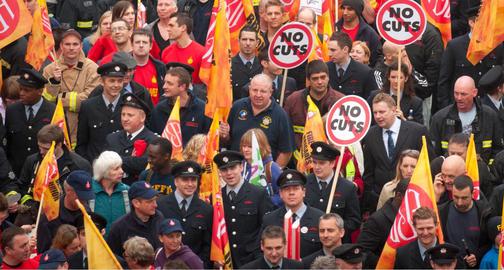When a major fire hit Tehran’s famous Plasco high-rise on January 19, it caused the building to collapse, killing at least 15 firefighters and an unknown number of others. Firefighters around the world expressed their sympathies for Tehran’s firefighters.
Among them was United Kingdom’s Fire Brigades Union, whose national officer, Dave Green, drafted the union’s statement of sympathy behalf of around 44,000 members working for the British fire services.
IranWire asked Green to speak about the history of his union, and the work it does in preventing fires and keeping its members safe.
“The Fire Brigades Union will be 100 years old next year, 1st of October to be exact,” he says. It started off in London, where it was originally called the Fire Trades Union, and has grown to serve firefighters across the United Kingdom.
“The way fire services were organized in the early 20th century, was very different from what exists now. There would be a volunteer brigade or a police fire brigade. You used to have little local brigades. So if you go around villages in the United Kingdom now, you can see an old fire station that just fitted a fire appliance and a horse.”
The union, he says, became the modern institution it is today during the Second World War when London endured frequent bombing by the German Luftwaffe.
“The war was the defining moment as regards the fire service and how it became highly unionized,” he says. “At the time, our membership was very low, probably eight or ten thousand people, mainly based in London. But the war concentrated people's minds on the role of the fire service.”
To respond to the bombing, the fire service enlisted thousands of men and women, and was effectively nationalized. By the end of the war the union had more than 30,000 members.
While the union existed mainly to serve its members and negotiate working conditions, it also began to influence government policy. “Since the 1950s and 1960s,” Green says, “a lot of legislation that was introduced as regards fire prevention, or regulations, for example on fire exits, or on materials used in clothing, came about through pressure from the FBU.”
The FBU, Green says, sees itself as the voice of firefighters across the UK. And in more recent decades, the union worked proactively with communities to make buildings safe before they can catch fire. “When I joined the Nottinghamshire fire department in 1985,” he says, “We had just started getting involved with communities doing lots of interaction, visiting care homes and other buildings, and making sure that legislation was followed as regards fire exits, fire doors, and keeping fire extinguishers up to date.”
That work has continued ever since. “We try and monitor, and if necessary change, government legislation to make communities safer.” Union activists, he says, have pushed for widespread “home risk assessments” whereby members of local fire and rescue services will visit private homes at the homeowner’s request to help identify and reduce fire risks.
“That's how we view ourselves, more and more, as trying to deal with prevention rather than the cure,” Green says. “Without a doubt, buildings are safer now as a result of campaigning. It's ironic that we're told that we don't need as many firefighters now because there are not so many fires. That is all because of the work we've done, so we are the only people who do ourselves out of a job.”
Another area of progress has been the Union’s efforts to reduce firefighter fatalities, especially after the 1972 Kilbirnie Street Fire in Glasgow killed seven firefighters. “There was a spate of firefighter fatalities on quite a large scale in the ‘60s and ‘70s,” he says. “That prompted a big change in how fire service operates. In the ‘50s and ‘60s, when a firefighter would go into a burning building wearing a breathing apparatus, there was no adequate means of keeping track of them. But now, there are rigorous monitoring procedures about people who enter burning buildings. We are very well trained as to what to do if someone becomes disorientated or injured.”
But as in Iran, resources for fire services in the United Kingdom are limited, especially in an era of government cutbacks under conservative governments.
“Unfortunately, governments are very keen on doing things that cut price,” Green says. “We are concerned the government has pulled back and that there is now a lot of self-assessment in public buildings instead of visits from the fire service.”
But the FBU will always push for greater caution. “We are currently running a campaign about sprinklers in schools,” Green says. “The government is looking at withdrawing sprinklers in schools of certain sizes. Our view is that a school needs to be sprinklered. It is an on-going battle.”
Green, who has watched video footage of the collapse of the Plasco building, says that any fire service needs to be well-funded for “what if” scenarios.
“We had 9/11 in America, and we had the 7/7 bombings over here. God forbid, if anything major happens, I think the British fire service would struggle to provide adequate cover.”
But organized labor, he says, is the key to saving lives. “We do recognize that some firefighters aren't as lucky as we are in the UK as regards being protected, and, as was demonstrated in Tehran last week, they work under very arduous circumstances. I think those pressing for legislation, and those pressing for good protective equipment, have made sure that firefighter fatalities, whilst unacceptably high in the UK, are not as high as in America and other countries. We make sure that there are safe systems of work in place, and that is what you get with having an organized workforce.”
visit the accountability section
In this section of Iran Wire, you can contact the officials and launch your campaign for various problems





























comments